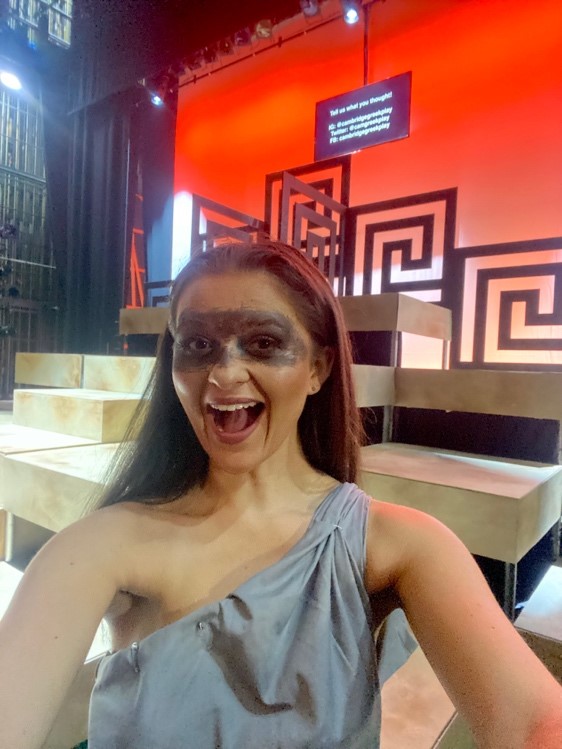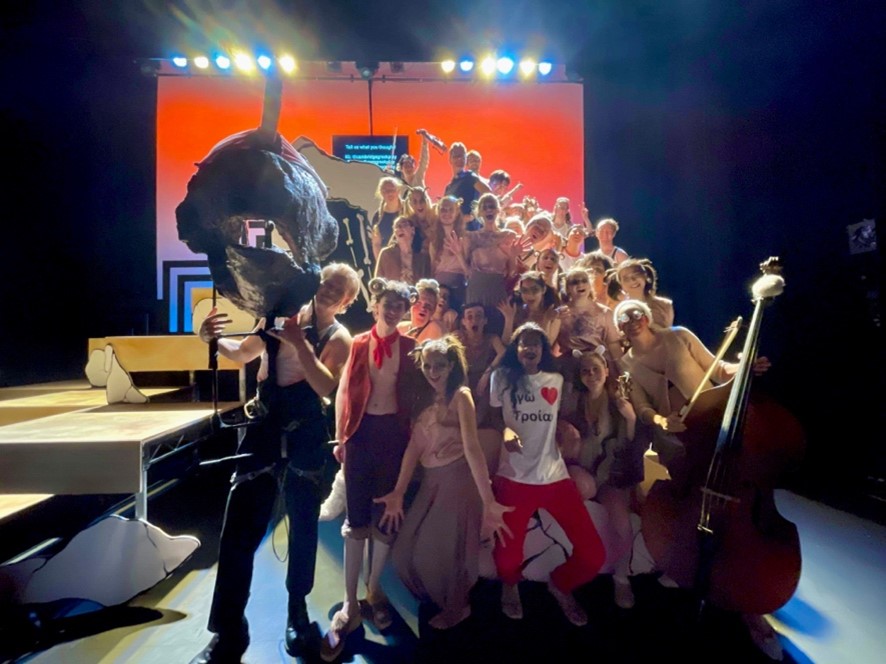Χαίρετε! Salvete! Hello to all and to all a…. wait - this is not Strictly Come Dancing; this is the CAMBRIDGE GREEK PLAY
My name is Cathryn-Olivia, and the dramatic introduction was just to get you in the theatrical mood to hear my experience of being an actress in this year’s Greek Play(s). I am reading Classics at Newnham College - Mary Beard’s domus - and am a Finalist in the third year of my Undergraduate degree. The branch of Classics that I’ve decided to climb is that of Philosophy - I am fascinated by Plato’s dialogues, and am a keen subscriber of Aristotle, too! This year I am writing a dissertation on how Cicero has adapted ideas from Plato about good rulership to criticise his contemporary Republican Rome through a philosophical and Platonic lens. During the Christmas break, I shall be residing in Cambridge to write up my thesis and read more Plato and Aristotle. If you have ever watched Brian Henson’s The Muppets Christmas Carol, where Ebenezer Scrooge is still at school learning about Plato and Aristotle in the Winter Holidays, then this is who I shall be identifying myself with, ha ha ha (*ho ho ho - I fully intend to partake in the Christmas Spirit though, unlike Mr Scrooge!).
What caught my attention most was the opportunity to become somewhat fluent in Ancient Greek by singing songs in Euripidean verse and Aeschylean metre. I felt like I really needed extra Greek language help in my Part IB course at the time of auditioning, so thought about leveraging this opportunity! I successfully became more familiar with the language through my passion for the performing arts. My brother and I both thought this was an ingenious idea. Additionally, having also watched Euripides’ Medea (2018) and Aristophanes’ Frogs (2020) at King’s College London, and Sophocles’ Oedipus Rex (2019) at University College London, I was very enthusiastic to partake in Cambridge’s own Greek Play.
In both shows, I was a Chorus Member. I played a bereaved Persian Elder in Persians and an all-singing and all-dancing Satyr in Cyclops.
I believe that my experience in the Greek Play absolutely crystallised my time here as a Cambridge Classicist. From flicking my multi-coloured Bic push pen up and down constantly, frustratedly trying to tackle a Greek unseen translation for the best part of a weekend in first year, I was later able to recite Ancient Greek. I started final year on stage, standing on a block-square of real estate, chanting from the lungs and by the heart the proem of Aeschylus’ Persians.
Aeschylus’ Persians evoked a heavy emotional response from us as actors. After the very first dress rehearsal, once we were offstage, I had gasps of surprise at the state of my makeup. When I looked in our dressing-room mirror, there were multiple black vertical streaks running straight down from my eyes that had worked their way right down to my neckline. All of us witnessed the very physical effects of hot tears leaking down our cheeks. We all experienced the anxiety and trauma that was collectively stirred into an atmosphere to portray the human grief of losing one’s loved ones in war.
Of course, during the eight shows we did encounter a particularly unique Matinée performance. After finishing singing the Persians prologue, our director met us on stage to apologise to the audience. Many of us thought that there had been an accident and had to stop performing immediately. I thought that the director had purposely improvised his own cameo into the Persians prologue that no one knew about. Either way, the abrupt halt to the performance instantly induced horror in our expressions as we stood there, arms raised, still acting. Nevertheless, it took one head turn back round to notice that the surtitles screen was blank. The audience had just watched us sing in Ancient Greek for minutes without knowing what was going on and found it very funny, after which we begun the Prologue again from the very start. Talk about déjà vu with Ancient Greek!
From an academic perspective, the most striking aspect was learning how Aeschylus dramatized events of recent contemporary history of the Persian War, rather than painting his tragedy with mythological colouring. In this regard, we attempted to incorporate this more human side of anguish into our acting through the palpable signs of distress such as wailing, crying, and groaning. It occurred to me on stage that different stimuli of grief and loss can still evoke very manifest lamentation – therefore, I was conjuring up all sorts of distressing images in my head to arouse intense sadness. I noticed that this allowed me to get as close as possible to depicting a mourning Persian. For instance, just because we are in the 21st first century, it does not discount that we can relate to the very same feelings of sorrow as the ancients did; albeit, due to a different cause. Therefore, I think that identifying how we still react in the same way to troublesome events that stir all sorts of deep emotions within us, can bring us closer to imagining what it must have been like for the ancients who suffered countless wars.







